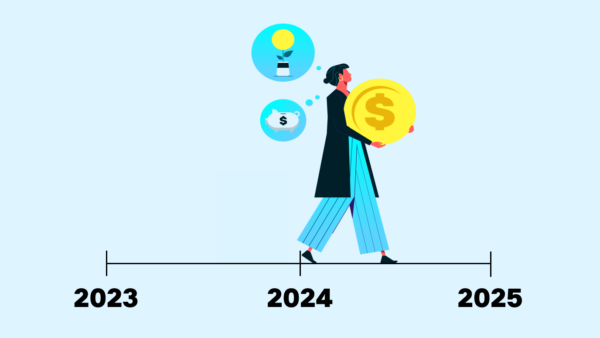Jan 9, 2024
9 Ways to Celebrate Financial Wellness Month

The new year comes with ample opportunities to reevaluate and plan your financial future. January is Financial Wellness Awareness Month, and it’s a pivotal time to regain control over your finances, especially after the bustling holiday season, which often goes hand-in-hand with hefty spending. Getting clarity about your finances early in the year can reduce financial stress, instill a sense of control, and lay a foundation for long-term financial health.
Celebrating Financial Wellness Month can be an empowering and enjoyable journey toward greater financial stability. So pick a few items from the list below and kick off your new year with a party where the guest of honor is your financial freedom.
9 ways to celebrate Financial Wellness Month:
- Take stock of your emergency fund
- Check your credit report
- Review your retirement plans
- Tackle your credit card debt
- Evaluate your student loan options
- Set saving and investing goals
- Review and rebalance your investment portfolio
- Build your 2024 budget
- Increase your financial literacy
1. Take stock of your emergency fund
Your emergency fund acts as your lifeline when unexpected events inevitably happen, so its health is critical to your financial wellness. Give it a check-up with these steps:
- Assess your current balance: Your fund should have enough for at least six months of living expenses in case you lose your income or have a major unexpected expense.
- Adjust goals: Tweak your target savings goal to reflect your current needs if your lifestyle or expenses have evolved in the last year.
- Replenish savings: If you spent money from your emergency fund last year, plan to build it back up in the coming months.
- Seek better rates: Keeping your money in a high-yield savings account or money market account helps your emergency savings grow faster with interest; shop around to see if you could get a better rate at a different bank or credit union.
2. Check on your credit
Your credit influences multiple aspects of your life, including loan rates, rental opportunities, insurance premiums, and even employment. So what better time to look into your credit report and score than Financial Wellness Month?
Your credit report is a detailed record of your credit history, while your credit score is a numerical reflection of your creditworthiness. Monitoring both can help you keep track of your financial standing, recognize signs of identity theft, and find opportunities to improve your credit. You’re entitled to one free credit report per year from each of the three reporting agencies, and you can usually get your credit score from your bank or credit card issuer.
3. Review your retirement plans
You’re likely hoping to enjoy your retirement party some point in the future. Make sure you’ll have the money you need by throwing yourself a retirement planning party for Financial Wellness Month. Include these activities in your financial festivities:
- Account overview: Start by examining all your retirement accounts, including 401(k)s, 403(b)s, and IRAs. Be sure you know about all the accounts you have, what institution manages them, and the balances in each. You might also want to estimate your future social security benefits, which play a crucial role in budgeting during retirement.
- Retirement calculator: Whether retirement is four years away or forty, you need to know how much money you’ll need when the time comes. Use a retirement calculator to find out how much you need to be investing every month in order to leave the workforce with enough to live on.
- Up your retirement contributions: If your employer matches a portion of your 401(k) contributions, don’t leave that money on the table. Bump up your contributions to at least the full amount that your company matches. And if you have an IRA, you have until April 15, 2024 to make contributions for the 2023 tax year; consider adding to your account if you haven’t yet met the contribution limits.
4. Tackle your credit card debt
The sooner you get out of debt, the sooner you can start earning interest instead of paying it. High-interest debt can quickly mount to daunting proportions, adding stress and pinching your budget. So it’s particularly important to pay this type of balance off as soon as possible.
For Financial Wellness Month, take yourself on a metaphorical trip to the mountains by choosing one of these popular debt-payoff strategies:
- The avalanche method: This approach involves paying off the debt with the highest interest rate first while making minimum payments on other debts. Once the highest interest debt is paid off, you move on to the next highest, and so on. This can reduce the total amount of interest you pay over the long haul.
- The snowball method: Instead of prioritizing by interest rate, the snowball method focuses on paying off the smallest balance first while making minimum payments on the rest. After the smallest debt is cleared, you move on to the next smallest. This approach provides a sense of accomplishment with each debt you eliminate, giving you motivation to stick with your debt-payoff plans.
5. Evaluate your student loan options
If student loan debt is weighing you down, making a bigger dent in it can increase your sense of financial freedom. This Financial Wellness Month, take a look at ways to pay off your student loans faster:
- Extra payments: One straightforward approach is to make extra payments on your principal balance. This reduces the overall amount owed and shortens the loan term. Even small additional amounts can make a big difference over time.
- Refinancing: Refinancing your student loans may lead to lower interest rates and potentially lower monthly payments. But be aware of the downsides: you might give up some debt-relief options, and there may be fees involved.
- Loan forgiveness programs: If you work in certain sectors, you might qualify for federal student loan forgiveness programs. Some teachers, medical professionals, government workers, and nonprofit employees can have some or all of their student loan debt forgiven after meeting certain criteria. If your career ambitions are leading you toward those fields, take a look at whether you might qualify for forgiveness.
- Consolidation: Consolidating multiple student loans into one can simplify your payments and sometimes lower your interest rate, which can make it easier to manage your debt and repay it faster. Just like refinancing, though, there’s a chance you’ll have to pay fees and might disqualify yourself from forbearance, deferment, and forgiveness programs.
6. Set saving and investing goals
What’s the real meaning of Financial Wellness Month? It’s more than just crunching numbers; financial health is all about helping you attain the things you really want in life. And to do that, you’ll need to set clear financial goals. This is your chance to envision what you want to achieve in the near and far term, then make a plan to turn those dreams into reality.
Settle in for a goal-setting sesh; grab some colorful paper and pens for extra merriment. Jot down your goals and group them into three categories:
- Short-term goals (within one year): Saving for a big trip, building a solid emergency fund, planning a wedding without going into debt… your short-term goals can be practical, fun, or both. Once you decide what you’re saving for, set up sinking funds and store your money in an interest-bearing account to help it grow.
- Mid-term goals (within five years): Common mid-term savings goals include a down payment on a house, buying a new car, or starting a small business. Consider using high-yield savings or money market accounts, which tend to offer higher interest rates than regular savings accounts while keeping your money easily accessible.
- Long-term goals (more than five years): These are typically retirement or long-term wealth accumulation goals, and they’re often for things decades into the future. Investing, whether through a brokerage account or retirement accounts, can help you work toward these bigger objectives. The longer time horizon lets you take advantage of compound returns and helps balance out the risk of stock market volatility.
7. Review and rebalance your investment portfolio
Investing for the long term doesn’t mean you shouldn’t keep tabs on your portfolio’s performance. Over time, changes in the market can shift how different assets weigh in your investment portfolio. Periodically checking your investments allows you to assess whether they still match your needs and goals. Consider the following factors:
- Asset allocation: Balance your investments across different asset classes like stocks, bonds, and funds, based on your goals, risk tolerance, and investment horizon.
- Portfolio rebalancing: Adjust your portfolio’s asset proportions to maintain your original allocation or adjust it if your risk profile has changed. If one type of asset has grown proportionately too large, you might sell some of that asset and buy more of another.
- Diversification: Diversifying your assets, or spreading investments across various classes, sectors, and industries, reduces the risk that a downturn in a single stock, sector, or market will significantly impact your overall portfolio.
8. Build your 2024 budget
Whether you’re an old hand at financial planning or are just getting started, creating a budget is a classic Financial Wellness Month activity. Take time to reflect on last year’s spending while it’s still fresh in your memory, making it easier to plan accurately for 2024.
- Analyze past spending: Review your 2023 expenses to identify spending patterns. This analysis will help you forecast your regular monthly expenses for the new year, plus alert you to expenses that caught you by surprise last year so you can plan for them this time around.
- Categorize expenses: Divide your expenses into categories that make sense to you, such as housing, utilities, groceries, transportation, entertainment, etc. Don’t forget to include infrequent expenses like annual subscriptions or insurance premiums, as well as consider things with variable costs like gas and dining out.
- Plan for savings and investments: Based on your financial goals, allocate a portion of your monthly budget to savings and investments. Whether it’s for an emergency fund, a down payment on a house, or retirement, regular contributions to these goals are crucial for achieving your bigger ambitions.
- Test drive some budgeting strategies: At its core, a budget is a plan for how you’ll spend your income each month. But putting that into practice is easier if you have a solid strategy. Try one or more of these popular budget approaches to see which makes the most sense for you: the 50/30/20 rule, envelope budgeting, or a zero-based budget.
9. Increase your financial literacy
They say knowledge is power, and Financial Wellness Month is a perfect time to power up your financial literacy. Dive into the world of finance by reading books or articles on financial topics, attending workshops or webinars, following reputable financial bloggers or podcasters, or even taking a financial literacy course. By embracing your financial education, you can increase your confidence and knock out financial stress.
Pave a prosperous future during Financial Wellness Month
However you celebrate, this month can be a catalyst for continued growth and achievement in your financial journey. Each step you take is a stride toward a more secure and prosperous financial future. And don’t forget, you’re celebrating Financial Wellness Month; give yourself a high-five for the progress you’ve already made and put a line item in your budget to treat yourself a bit for taking steps toward greater financial health.
And remember to keep the party going all year long by keeping up with your monthly budgeting, debt management, saving, and investing plans. After all, National Financial Awareness Day is on August 14, 2024, so you’ll want to be prepared for your next financial wellness celebration.

Investing made easy.
Start today with any dollar amount.

Related Articles

The 2024 Financial Checklist: A Guide to a Confident New Year

Budgeting for Young Adults: 19 Money Saving Tips for 2024

The Best Personal Finance Books on Money Skills, Investing, and Creating Your Best Life for 2024

What Is a Financial Plan? A Beginner’s Guide to Financial Planning

How to Save Money: 45 Best Ways to Grow Your Savings

Exploring the 50/30/20 Rule: A Simple Budgeting Strategy





